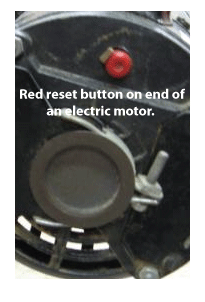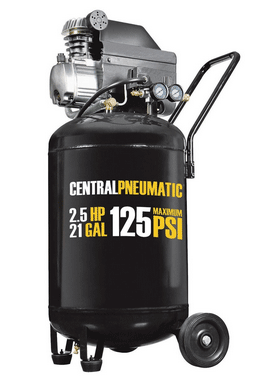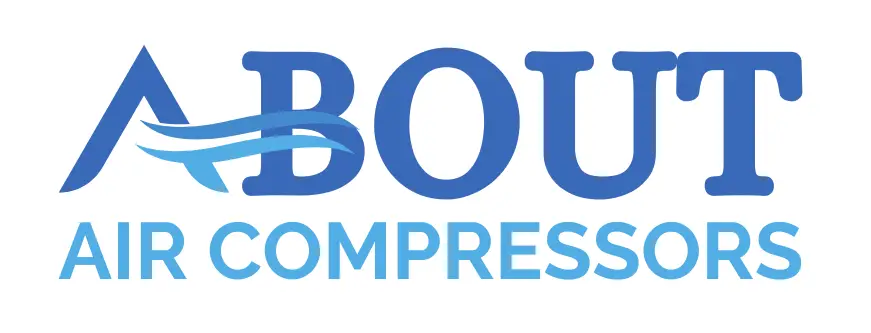A common problem with Central Pneumatic air compressors is the Central Pneumatic air compressor reset button tripping. This article will provide you with the most common reasons as to why this is happening, along with existing reader questions & responses!
Visit our Central Pneumatic Air Compressors – Information, Manuals, Service Locations for more information on this brand of compressors!
Table of Contents
- Reasons Central Pneumatic Air Compressor Keeps Tripping Reset Button
- FAQs (Frequently Asked Questions)
- Reader Questions & Responses
Reasons Central Pneumatic Air Compressor Keeps Tripping Reset Button
There are a few reasons as to why your reset button may be tripping on your air compressor and these are:
- Power supply
- Air compressor runs too long
- Centrifugal switch
Power Supply
Check to make sure that your air compressor is plugged right into the wall socket, and that it is not being powered through an extension cord or power bar. They may not be large enough to allow the flow of power that the compressor motor needs to operate efficiently.
Air Compressor Runs Too Long
If you are using your air compressor for extended periods, the typical DIY air compressor will overheat. The duty cycle of the compressor may be less than the time you are requiring it to run, and the motor will overheat.
If you believe this is happening to your air compressor, try only running it for ten minutes and then letting it sit for at least the same amount of time so that the motor can cool, before firing it up again.
Centrifugal Switches
The centrifugal switch can stick which will keep the start windings energized tripping the thermal switch. If the centrifugal switch were to get stuck in an open position then the windings won’t shift properly.
The start windings can’t withstand the heat of the compressor’s full RPM which subsequently causes the compressor to overheat and the reset button to trip.
For more detailed information, please visit our Air Compressor Reset Button Always Trips – Air Compressor Keeps Tripping Overload guide here!
FAQs (Frequently Asked Questions)
One of the most common problems for reset button tripping is due to excessive air compressor usage, otherwise known as the compressor running too long and causing the compressor to overheat.
Reader Questions & Responses
Central Pneumatic Air Compressor Keeps Tripping Reset Button
Question
I turn on my air compressor and it will run up to about 25 pounds pop the black reset button on the side of the motor, I wait a few minutes to reset and it will run for about another 10 or 20 pounds, and pop the button again. I have had this for about 5 years and never had this problem before it would pump up to 110 pounds no problem this is a 21-gallon upright compressor.
Response
It sounds like the compressor motor is overheating.
Assuming all is mechanically correct on the compressor, then John, I would look to the run capacitor, or the motor itself failing.

Central Pneumatic Air Compressor Reset Button Keeps Tripping
Question
I need to replace the reset switch as the compressor reset switch keeps popping out. I have to reset the switch in order to use the compressor and I feel that this is happening too many times. I can plug it into the wall plug and it still does it.
Response
Vern, does the compressor run for a while before the reset switch pops out, or is it happening on startup?
If the reset switch keeps popping, that suggests to me that the motor is overheating and that it is not the switch that is the problem, but the motor overheating that is causing it.
It would be good if you had included the model number of your compressor, and provided some idea of whether the compressor is new or well used. If well used, you quite likely have other air compressor problems than a reset switch.
Can you provide more details as a comment here?
Question
It’s a little more than a year old. It just started popping when I hit the reset button.
I unplugged it from the receptacle and waited 30 mins. And tried it again but the same problem it won’t fill up with air since the reset keeps popping. Any advice?
Question
Response
Central Pneumatic model 61454 overload
My 61454 keeps tripping the overload protector?
by Chris H
(New York)
I have a 5 year old central pneumatic 21gal compressor model 61454 that keeps tripping the overload protector.
When I turn the unit on it runs for ~15 seconds then trips the overload.

If you hit the reset button the unit will run for ~5 seconds then trip the overload again, which you can keep repeating.
If you let it sit for 1 minute you can reset the unit will run for ~15 seconds again.
The unit is in great shape and hasn’t been used that much.
The unit is on its own circuit which it has been on for the last 5 years.
After reading some different complaints about the unit I replaced the oil with fresh synthetic compressor oil which did nothing.
Seeing that people complain about the capacitors going bad on them I checked mine. The unit has 1 capacitor, it has a few minor dents on it, but it appears to be functional (builds resistance when hooked to a multi-meter).
Any thoughts what the problem could be?
____________________
Could it be overcurrent?
A couple of thoughts –
Is the filter reasonably clean?
Otherwise, sounds like a motor failure, or the overload protector is broken/weak.
Ideally, check the current with a clamp-on meter or something like a “kill-a-watt” meter. Should be 13-14 Amps. If that’s the case, and it blows, then the protector is bad.
If it’s much over 15A, then you may have a motor problem, and hope it’s the cap. When they lose capacitance, that can cause this, even though it’s not “clearly bad” as in open or shorted.
Let us know how you make out, please.
Good luck.
______________________
More info
Thanks for the suggestions Doug.
I checked the filter and it looks clean.
I then picked up a clamp meter and tested the unit. The number fluctuates a lot…but it seems to be running about ~16.6 amps on the hot lead, ~15 on the neutral and ~1.6 on the ground…then pops the overload…
So it seems, like you said, its a motor problem.
Is there other way to test the capacitor other then measuring the resistance like i did? If it is just the capacitor any suggestions where i could purchase one for the unit…some people online say its a hard one to find and that harbor freight is no help…i even saw people talking about combining 2 smaller capacitors to get the correct capacitance of the one on the unit.
____________________
Where to get capacitor
Any capacitor that has the same microfarad rating ( µF ), and the same voltage, should work, as long as you can get it to fit the footprint.
________________________
More on overload
Chris:
ALL of your current from the hot side should be going thru the neutral, and ground should be zero.
\An electrically leaky cap might cause that.
If you have a GFCI breaker on it, it should trip, but I’m guessing you don’t.
Some multi-meters have a capacitance range, but they may not be able to accurately read large caps, so if you decide to buy, check that it goes high enough. Google “capacitance meter” and you’ll find a few, along with a good explanation of how it works from Fluke.t
The manual doesn’t seem to have the value(s) the cap. What is it? Maybe I can help with that.
And yes, unfortunately HFT is not very good about spares, like most sellers. Sadly, it’s just not economical to do so.
___________________
More info
by: Chris H
Thanks again Doug and Bill,
You are correct about the unit not being on a GFCI breaker…should it be?…Turns out that the clamp meter I picked up can do capacitance. I tried testing the capacitor, but it overloads the meter….i checked manual for the meter and it can’t measure past 100uF or the capacitor is bad. After seeing that i can’t measure the capacitor with my meter i tried testing it again with resistance….this time i get no resistance at all…Could the capacitor have fully failed when i played with the unit trying to measure the amps?
The capacitor specks are as follows
Huizhong CBB65A
130uF +/- 5% SH
250VAC 50/60Hz
40/85/21 CP
Internally Protected
10000AFC PB1300
on Amazon I see capacitors with
108-103uF 250V
130-156uF 250V
would either of these work…or do i need to be more exact with the 130?
Thanks again for your help
__________________
GFCI and Capacitor
I mentioned the GFCI because if there were one, it’s failed. Not having one is OK, but a while back the NEC started requiring them on all 120V circuits, even lights. They used to require them only on circuits subject to dampness, like laundry, kitchen and bath rooms.
Anyway, capacitor:
Given the value, (130mfd or 130μ), and voltage, it would be a start cap. That being the case, it’s not critical, so I’d go with the cheaper one, as long as 130μ is in its range.
I suspect that the cap that’s failed was available cheap, and the +/-5% is overkill. If it were a run cap, then it’s more critical because it’s in the circuit all the time.
You might consider getting one of each, as it’s possible that the reason this one failed is that the centrifugal switch in the motor is also failed (not opening), which will cause the new cap to fail, sooner or later.
HTH, and good luck.
________________
It’s not the capacitor
Doug,
Sorry it took a while to respond.
I ordered a new 108-130uF starting capacitor and swapped out the old one. Unfortunately my compressor is still having the same issue of running for 15 seconds then tripping the overload. The unit is still reading in the high 16 amps and I am still getting an amperage read on the ground with the new capacitor. I assume that probably means the motor is shot and I should consider replacing it or the whole unit.
___________________
Not an overload issue
if your compressor starts up then shortly trips the built in breaker, it has nothing to do with the electrical system.
Simply look on the head of the motor, you will see a screw in valve with a nipple on it. seems to be a compression release to prevent hydro locking. Unscrew it and turn on compressor. it will leak out from here. however, if it keeps running without shut down, there is your problem. I have the same model and as of this day cannot seem to find a replacement part for it. just adding my 2 cents in. thanks.
__________________
About not an overload issue by: Anonymous
I beg to differ.
It appears you refer to part 3 in the parts list.
It is called out as “start valve”.
That’s actually an engineered leak to relieve pressure on the pump head when it stops. It is an inefficient substitute for an unloader.
In case you are not referring to item 3, say which it is.
____________________
Central pneumatic bogging down
Two things here , I have worked on industrial air compressors for 12 years. If it bogs down and trips the breaker it’s more than likely the check valve on the tank not the start valve. Or your capacitor is going out and bogging the motor down. The pressure switch relieves the head pressure on shut down not the start valve.
If you have any questions regarding Central Pneumatic air compressor reset button tripping, please leave a comment below, with a photo if applicable, so that someone can help you!
